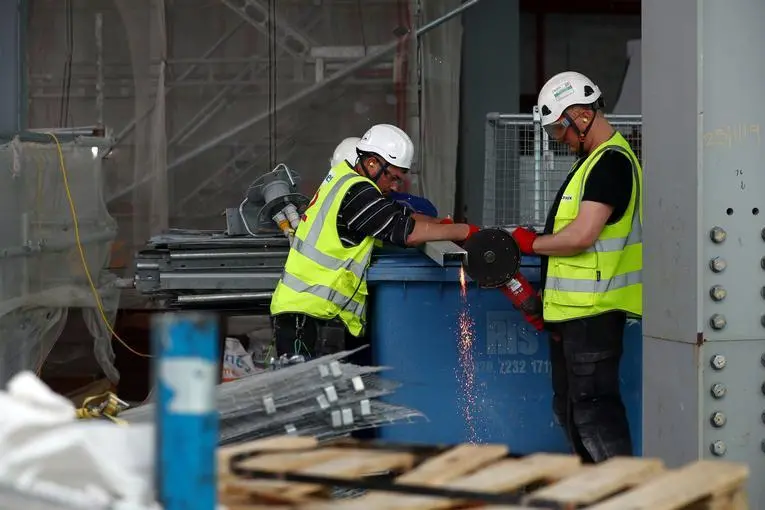PHOTO
Muscat: Economic advisors in Oman working with the government have called for complexes to accommodate expatriate workers to be built outside of residential areas to ensure they are provided proper living conditions and facilities they will require while in the country.
The step will also help preserve the atmosphere of residential neighbourhoods primarily occupied by Omanis and expats who live with their families, and Osama Al Sibani, the director of the Economic Development Department at Muscat Municipality, said the government body had been working on an accommodation plan for workers for the last five years.
“The municipality is intent on establishing worker complexes in Muscat, and has been working on such a project in Wilayat Bousher, to bring down the number of workers living in residential areas,” he said. “This project is in coordination with other government bodies and private sector companies. We hope the one in Bowshar is completed soon, so that we can move onto the one in Amerat.
“The municipality prepared a list of locations for worker complexes, which was well received by investors, but work on it was temporarily stopped because of the lack of necessary legislation required to protect the rights of all parties related to the project,” added Al Sibani. “One of the suggestions we have in terms of legislation is for companies to not bring in any expat workers unless they are housed in these complexes.”
The worker complexes, once set up, will contain a number of facilities their inhabitants require on a regular basis, including shops, laundry services, barbers, restaurants, recreational facilities, banking and money transfer services, and a gym, in addition to facilities provided to and from their place of work.
Plans to establish such facilities had been previously discussed by a number of organisations, including the Oman Chamber of Commerce and Industry (OCCI), General Federation of Oman Workers (GFOW), Muscat Municipality, and the Majlis Al Shura.
“Muscat Municipality faces a great problem when it comes to unorganised housing of expatriate workers in residential housing areas,” admitted Al Sibani. “We have therefore issued a circular preventing them from living in residential neighbourhoods, so that their social fabric is maintained.
“There are, unfortunately, negative effects to them living in these areas, and despite our efforts, we find that owners of flats of villas often put them up in their homes, leading to a breach of the laws,” he went on to say.
“We do monitor such cases, because we often receive reports of workers living in neighbourhoods. However, we face difficulty in entering villas in which they live, because entering them requires permission from Public Prosecution. Getting this takes time, and only then can we evacuate the premises.”
Al Sibani said that another of the key issues faced by workers put up in residential homes was overcrowding, which resulted in poor sanitary conditions.
“Because so many workers live in one house, they find that not all of them can enter or live in them during their rest time, which leads to many of them wandering the streets,” he revealed. “We’ve found that nearly 90 percent of expatriate workers who live in residential areas do so without a rental agreement. The municipality therefore must confirm that apartments in which expatriates live are leased under the correct conditions.”
Adding to this, Mohammed Al Abri, the Director of Small and Medium Enterprises at the Oman Chamber of Commerce and Industry, said it was the responsibility of those who employed workers coming to Oman to find them proper housing, and to treat them fairly and without prejudice.
“It is important that we convey the right image of the Sultanate to human rights organisations,” he said. “As a temporary solution to housing workers until these complexes are set up, what can be done is allocate accommodation in certain residential areas near their work sites. This will help in ensuring the regulations we have in place are followed.”
Hilal Al Sarmi, a member of the Shura Council said the issue of overcrowding among expat workers needed to be tackled because of the poor sanitation and the associated risks to people’s health, a particularly pressing concern owing to COVID-19.
“It became clear that their presence caused great harm,” he explained. “. We saw this during our programme to eliminate the effects of the Aedes Aegypti mosquito. Some homes also acted as hotspots for the coronavirus pandemic.”
Located in Duqm, Al Nahda Village is an example of the sort of worker complex that is being replicated in other parts of the country, according to Mahmoud Al Rawahi of the Supervision and Compliance Sector from the Public Authority for Special Economic Zones and Free Zones. The camp currently accommodates 17,000 workers, which represents 93 percent of occupancy. Work is underway to expand the camp to house 30,000 people.
“We aim to provide workers a standard of housing that meets health and safety specifications and is in line with international practices,” he said. “This is one of the most basic rights of workers. 80 percent of people living there were satisfied with the conditions present. Providing decent housing to workers is needed to guarantee investment to the country.”
© Muscat Media Group Provided by SyndiGate Media Inc. (Syndigate.info).





















